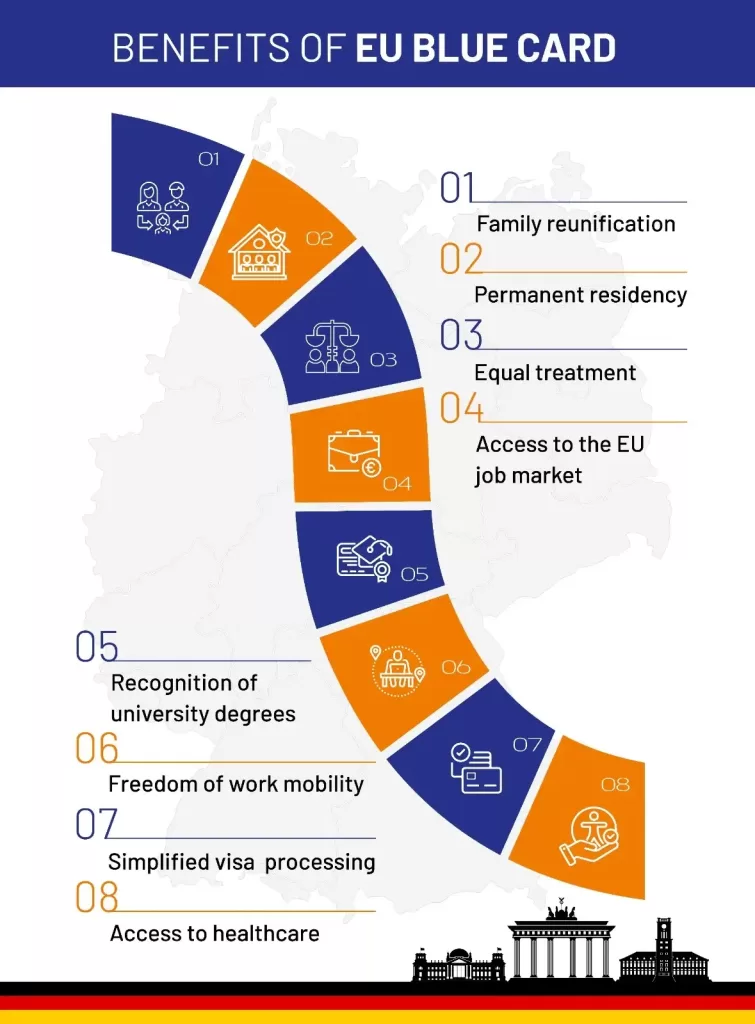
The EU Blue Card: Your Gateway to Europe

The EU (European Union) Blue Card was established in 2012 to encourage highly skilled workers outside the European Union to work and live in Germany. The program was created as part of Germany’s and the EU’s efforts to address the shortage of skilled workers in the region.
What are the benefits of the EU Blue card? What are the steps to apply for it? And the eligibility criteria to apply. This article will strive to provide a comprehensive answer to these questions.
What is the EU Blue Card?
As stated before, the EU Blue Card is a program primarily designed to attract highly skilled professionals outside of the European Union to come and live in its countries, particularly Germany.
By creating a stable and secure environment, the EU Blue Card offers a path to long-term residency and eventually permanent citizenship to those participating in the program. It is a win-win for all the parties involved:
- The professionals will get a chance to live a prosperous life in Europe
- The European Union will fill the gap concerning the shortage of skilled professionals.
The main purpose behind the EU Blue Card is to address the shortage of skilled professionals in Germany and the wider European Union. The benefits for the holders of the EU Blue card are immense, like access to highly paid jobs and other benefits normally available to a citizen of the EU. We will discuss this in the subsequent chapters but for now, let’s look at the EU Blue Card eligibility first.
What are the EU Blue Card Eligibility Criteria?
Before you can start applying for a Blue Card, there are certain eligibility criteria laid out by the EU. If you meet these criteria, your application process will be smooth. The EU Blue Card eligibility criteria are as follows:
Higher education qualifications
Applicants must possess a degree from a tertiary education program of three years. It can be a university degree or an equivalent qualification.
The degree must be equivalent to the job offer they have received. In addition, for degrees obtained outside the European Union, applicants must pass an equivalency assessment to ensure that the degree obtained meets the standard set by the European Union.
Contract of Employment
The applicant must have a valid job offer or an active work contract of a minimum of one year. The job offer in turn must be a highly skilled profession as defined by the EU Blue Card Directive.
Salary Threshold
The offered salary must meet or exceed the minimum threshold set by Germany or any other respective EU country. The threshold is generally above the average annual salary offered in the country of employment. This is in place to ensure that the applicant is being fairly compensated for his/her skill and expertise.
Work Experience
The applicant must have proof that he/she has worked in the relevant field for which they have received a job offer for at least five years.
Financial Resources
The applicant must show that they have the financial means to support themselves and their family members – should they join the applicant to stay in the EU. The requirements may vary from member state, but usually, the requirement consists of having a certain amount of savings, regular income, or a combination of the two.
Health Insurance
Applicants must be covered by a health insurance policy that protects them or any of their family members who choose to stay with them. The duration of the policy must be a minimum of one year and must cover all medical expenses to give access to quality health care.
Now that the EU Blue card eligibility criteria have been laid out, let’s see what the application process for the same looks like.
Who can apply for an EU Blue Card for Germany?
The application process for an EU Blue card is pretty much the same, but we will place a special focus on Germany in the case of this article. Once you are sure that you meet all the eligibility criteria mentioned in the previous chapter, then you are qualified for the EU Blue Card for Germany.
The documents required for the application process are as follows:
- A valid international passport
- Applicants will be required to fill out an EU Blue Card application form which is available online. The application form for Germany can be found separately on its respective website. Details such as educational and professional qualifications must be filled.
- A valid work contract that gives details such as job title, description of the work, starting date, and salary must be presented. Applicants must ensure that their employer is a valid one in the EU.
- Documents showing proof of financial resources, such as pay slips, bank statements, or allied documents.
- Health insurance documents that cover the applicants in the EU country of residence. In this case – Germany. The insurance must cover medical emergencies, hospitalization, etc.
Do note that each EU country will have additional requirements, so it is prudent to check out the immigration website of the country you want to apply to.
Once the required documents are gathered it is time to have a look at the application processed for an EU Blue Card.
The application process for EU Blue Card
Now to get an EU Blue Card, you have to visit the Foreigner’s Office in the respective EU Country. For this article, we will describe the process for Germany.
The process from here is as follows:
- Set up a visa appointment by contacting the German Embassy or Consulate in the applicant’s country of residence. In case there is neither, the applicant must travel to a neighboring country to set up a visa appointment.
The German embassy will provide a list of documents required for a German work visa. Documents like work contracts, financial records, health insurance, etc. - On the date of the appointment, the required documents must be submitted and a fee must be paid. Applicants may also be required to attend an interview for the same.
- Do note that this is just the process for an entry visa. The actual EU Blue Card can be obtained once the applicant has reached Germany.
- The applicants must wait to hear a decision on the visa application, which may take about one to three months.
- If and when the applicant’s entry visa is approved, they can travel to Germany. Once there, they have to register their residence, obtain German health insurance, and open a local bank account.
- Once the residence, insurance, and bank accounts have been sorted, the application for an EU Blue card can be submitted to the Ausländerbehörde (German Foreigners Authority). Do note that this process must be started six weeks before the expiration of the applicant’s residence permit.
The application fee for an EU Blue card is 100 Euros which can be paid online. No refunds in case the application is withdrawn or rejected. Once the application is successful, the applicant be called for an interview post which will take 3-4 weeks until the EU Blue Card is issued
Benefits of EU Blue Card
Once the applicant gets his/her EU Blue Card, they will get a whole host of benefits They are as follows:

Permanent Residence
Once the EU Blue card holder has completed five years of residency, they can apply for a permanent residence permit in Europe. Permanent residence will ensure a path to long-term security and stability.
Access to Healthcare
The EU Blue Card looks after the well-being of its holders by providing comprehensive health coverage and other social benefits available in the EU country of residence.
The social benefits include:
- Family benefits
- Unemployment benefits
- Pension benefits
Promotes Mobility
An EU Blue Card holder can travel and live in other EU nations without any additional restrictions for up to three months.
While one can always make their own path in finding their gateway to Europe, it is always better to have experienced consultants to help you in this regard. Hence, look no further than Zeiq Consultants, your premier partner in immigration.
FAQs

